Police Divestment Efforts Must Include Universities


Despite their intended role as peacekeepers, private university officers are often responsible for violence against students and local residents alike. In July 2015, a University of Cincinnati police officer fatally shot unarmed 37-year-old Sam DuBose. Tyrone West, a 44-year-old Black man, was killed by Morgan State University police in 2013 during a traffic stop. And in 2018, a University of Chicago police officer shot fourth-year student Charles Thomas.
Sam DuBrose, Tyrone West, and Charles Thomas are just three names on an ever-growing list of people who have been injured or lost their lives at the hands of private police officers. Student dollars go toward the upkeep of these oppressive institutions, which are responsible for the violence and mutilation of bodies.
The presence of these forces on and off campus is not welcome — not by students, and not by the communities at large.
More than one third of four-year colleges across the country are equipped with their own well-funded, private, and armed police forces that make arrests every day. Yet despite functioning as full-fledged law enforcement, these departments are able to evade public record laws, allowing countless cases of police abuse and force to go unseen and unpunished.
In most states, public record laws apply to private organizations that employ government authority to perform a governmental function. There is no question that campus police fall into this category. But universities continue to argue their private status makes them exempt from such records requests, protecting themselves and displaying a flagrant disregard for accountability.
The Clery Act, signed in 1990, aimed to create accountability for campus police forces. But the law does not go nearly far enough. For example, while it requires the maintenance of a daily crime log, campus forces often provide little detail and are easily able to withhold information. This statute is the sole measure in place to ensure the accountability of armed campus police officers.
The majority of these private forces are not just policing their respective campuses, but also have jurisdiction deep in local cities. For example, the University of Chicago is home to one of the largest private police forces in the world. The student body numbers under 15,000, but the UC Police Department puts boots down in surrounding neighborhoods, placing 65,000 city residents under the watch of a force with virtually no accountability.
This arrangement is not unique to Chicago. In cities like Detroit, New Orleans, Philadelphia, and South Bend, Indiana, campus police departments also patrol in the city, often in predominantly Black neighborhoods which already suffer from devastating structural inequalities. People of color, especially Black folks, feel afraid of the people meant to make them feel safe. Educational institutions and the spaces around them can be emancipatory; yet, people of color find themselves in chains.
Young people have started to take notice, and have called for the end to private police on campus. Last year, students at Johns Hopkins University in Baltimore demanded the university reverse its decision to create its own police department. Coalitions of students, faculty members, and neighbors at Harvard University, University of Virginia, Columbia University, and Ohio State University have also called for the removal of private police forces.
But let’s be clear: Universities without private police forces are not spared from the horrors of police brutality. Partnerships with local police are also bringing unwanted publicly funded officers onto campuses.
While these forces may not run into the same issues with open-record laws, they come with their own array of atrocities. Public police departments with known patterns of corruption, excessive use of force, and racial profiling are welcomed onto campuses with open arms by university administrators.
Following demands organized by students, the University of Minnesota recently agreed to cut ties with the Minneapolis Police Department. Northwestern University, Columbia University, and New York University students are also calling on their administrators to cut ties with local police. Administrators should follow the lead of student activists and institutions like the University of Minnesota and cut ties with local police departments. Universities are responsible for the safety of their students and the surrounding community — and police have proven time and time again to pose a threat to safety, rather than promote it.
As calls to defund the police grow, it is imperative that private police forces with no accountability are prioritized. Heavily armed police forces with no transparency are inexcusable, and university administrations must move to defund them. On college campuses, our nation’s playgrounds for research and discovery, we must protect our young minds and the precious communities that surround them at all costs.
Any other choice is a blatant denial of safety and justice to people across the country 一 those who pay to attend these institutions, and those who live in the communities intruded upon by them.
CORRECTION: An earlier version of this article incorrectly stated that all three students were killed by university police. Charles Thomas was injured, not killed. We regret this error.


